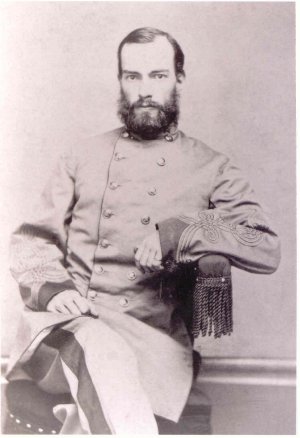 Edward Clifford Anderson, the last of three commanders of the 7th Georgia Cavalry, was born in 1839 to George Wayne Anderson, a major during the War of 1812, and Eliza Clifford Stites. He was named for his uncle, Edward C. Anderson, and designated "Junior" to distinguish him from his elder kinsman. He was educated at the University of Virginia and graduated with a Bachelor of Laws degree in 1860. That same year, he married Jane Margaret Randolph of Albemarle County, Virginia, the daughter of Colonel Thomas Jefferson Randolph and great-granddaughter of Thomas Jefferson.
Edward Clifford Anderson, the last of three commanders of the 7th Georgia Cavalry, was born in 1839 to George Wayne Anderson, a major during the War of 1812, and Eliza Clifford Stites. He was named for his uncle, Edward C. Anderson, and designated "Junior" to distinguish him from his elder kinsman. He was educated at the University of Virginia and graduated with a Bachelor of Laws degree in 1860. That same year, he married Jane Margaret Randolph of Albemarle County, Virginia, the daughter of Colonel Thomas Jefferson Randolph and great-granddaughter of Thomas Jefferson.Anderson joined the Georgia Hussars as a private in January 1861. He was elected 2nd Lieutenant of Company B when it was formed on September 9, 1861. In November, he received a staff appointment from Brigadier General H.W. Mercer where he served until he resigned in April 1862 to seek a field assignment. Anderson raised a company of partisan rangers known as the "Randolph Rangers" and which, upon his application to the War Department, was changed to regular cavalry in October 1862. He was commissioned a "captain of partisan rangers" on July 21, 1862.
With the consolidation of a number of companies into the 24th Battalion of Georgia Cavalry, Anderson, as senior captain, was appointed a major on January 12, 1863 and placed in command. He commanded the 24th until it was consolidated with the 21st Battalion of Cavalry and the Hardwick Mounted Rifles to form the 7th Regiment, Georgia Cavalry in February 1864. Anderson remained a major when assigned to the 7th and, although the first commander, Colonel William Parker White and his replacement, Lieutenant Colonel Joseph Longworth McAllister, were killed in April and June 1864, respectively, was not promoted to Colonel until October of that year. He remained in that position until the end of the war.
Anderson was a prolific record keeper and, as a result, much of the history of the 24th Battalion and the 7th Regiment is available today. He was also tireless in his efforts to attend to the duties of his command. He was a devout and fiercely patriotic man. He frequently invoked scripture in his writings whether military or personal.
When the 7th Regiment was created in February 1864, Anderson was exceedingly disappointed that Joseph L. McAllister was commissioned Lieutenant Colonel over him. He fired off letters to everyone from the Secretary of War to his father extolling his credentials over McAllister's while insisting that McAllister was a dearly beloved friend for whom he had nothing but the highest esteem. However, when his appeals were heard and the appointments sustained, Anderson spoke no more of the matter and set about his duties as regimental Major with his usual zeal. With the death of Colonel White and the elevation of McAllister to command, Anderson assumed the duties of Lt. Colonel when the 7th marched off to Virginia.
At Trevillian Station on June 11, 1864, Anderson was wounded in the hip and fell into enemy hands. The following day, during the confusion of the Yankee retreat, he escaped and made his way back to his unit. He convalesced at Edgehill, the home of his in-laws, the Randolph's, near Charlottesville. He soon returned to the 7th and resumed his duties, this time as the regimental commander. He and the remaining members of the regiment were kept very busy resisting Grant's moves against Petersburg for the rest of the year.
Colonel Joseph Fredrick Waring, commander of the Jeff Davis Legion, was appointed to head a board of examiners to test Anderson for appointment to colonel of the 7th. After three days of rigorous examination in early August, 1864, Waring recommended that he be promoted to that position. Anderson was appointed colonel on October 29th.
In December 1864 Anderson was sent to Georgia with approximately 200 dismounted men of the 7th. These, along with several hundred more dismounted troopers of Young's and Butler's Brigades, returned to Georgia ostensibly to remount themselves. Anderson and his detachment of the 7th Cavalry troopers joined in the defense of Savannah. With the evacuation of that city many of them operated as "irregulars" in that vicinity until the end of the war.
After Lee's surrender, Anderson surrendered to Union forces in Savannah and was paroled. He returned to his family business interests which included banking and railroads. Edward Clifford Anderson, Jr. died on September 27, 1876 of yellow fever during an epidemic. He was at Whitesville, Georgia at the time of his death and was buried in the Family plot in Laurel Grove Cemetery.
Information provided by John Latty.